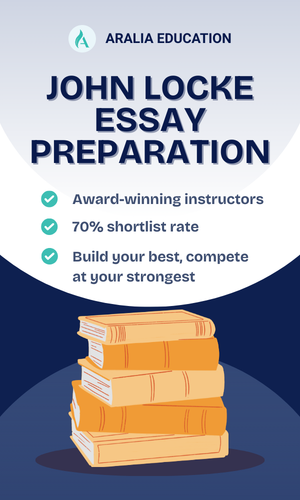Why Aralia Students Stand Out
Preparing for the Application Process
The Common App portal opens on August 1 every year. U.S. News recommends that students begin preparing their application materials well before this deadline. Ideally, by the time the portal opens, most of your documents should be ready, so you can quickly fill in the required details and upload your materials with no delays. Here’s what you can do before August 1 to get organized and stay ahead:
Research Each University’s Application Policy
Although the Common App is accepted by more than 1,000 U.S. colleges and universities, not all schools use it. Some states use their own portals, such as those of California universities or Texas universities, while others use third-party vendors. To check if your target schools accept the Common App, you can search directly on the Common App’s college search tool and verify on each university’s official admissions website.
Here are some examples of popular schools that are not in the Common App system:
Massachusetts Institute of Technology (MIT)
- Application Platform: MyMIT (MIT’s proprietary portal)
- MIT prefers an application tailored to their criteria to better understand each applicant’s fit and potential.
University of California System (e.g., UCLA, UC Berkeley)
- Application Platform: UC Application
- The UC system has specific requirements and processes that are best managed by its own platform features.
- Application Platform: Georgetown’s own application portal
- Georgetown has chosen to maintain a separate application process to align with its institutional priorities.
California State University System (e.g., San Francisco State University)
- Application Platform: Cal State Apply
- The CSU system utilizes Cal State Apply to streamline applications for all 23 campuses.
Aside from checking platform requirements, be sure to review each school’s admissions guidelines carefully. Some schools encourage students to submit a résumé, while others do not. Understanding these nuances will save you time and ensure accuracy when preparing your documents. Organize those details in your notes to manage your deadlines and priorities.
Prepare Your Application Materials
Even before the portal opens, you should start compiling these key requirements:
Standardized test scores and official reports (SAT, ACT, TOEFL, IELTS, etc.)
Request your official scores early to ensure they reach each university on time, since it often takes a while for scores to be prepared and delivered. Check each school’s requirements, as some may superscore—a process which combines the student’s highest section scores from a standardized test to create a higher composite score—or only accept specific tests. Most importantly, planning ahead will give you allowance to retake exams if needed and avoid last-minute stress.
Personal Statement (main essay for U.S. universities)
Your essay is an opportunity to showcase your personality and unique experiences. Begin drafting an essay early to allow time for reflection and multiple revisions. Ask for feedback from teachers or mentors, especially those who are well-versed in the application process to U.S. universities. Focus on telling a clear, cohesive story instead of trying to cover too many things at once. Admissions officers value authenticity and clarity more than quantity.
4 Steps to Write Common Application Essays
Translated and notarized documents (academic records, transcripts, certificates)
If your documents are not in English, most universities require official translations. Notarization ensures that translations are legally recognized. Preparing these documents over the summer reduces stress for when school starts and gives you time to correct any errors. Keep both physical and digital copies organized for convenient submission.
Extracurricular activities and awards
Select experiences that best highlight your skills, leadership qualities, and passions. Quality is more important than quantity. Admissions officers look for depth, commitment, and impact. Include awards or honors that demonstrate achievement and growth, and consider how your personal experiences and background connect to your academic or career goals.
Résumé (if applicable)
A résumé provides a concise overview of your achievements, experiences, and skills. Highlight accomplishments most relevant to your intended field of study. Check each university’s policy on résumés, as some prefer a short list of activities within the application, while others prefer a résumé formatted traditionally.
Step-by-Step Guide to Using the Common App
Step 1: Create an Account
Go to the official Common App website and select “Create an account.” You can do this months in advance or even years before the application cycle.
Choose your account type:
- “First year student” if you are applying as a freshman.
- “Transfer student” if you’ve already studied at a university.
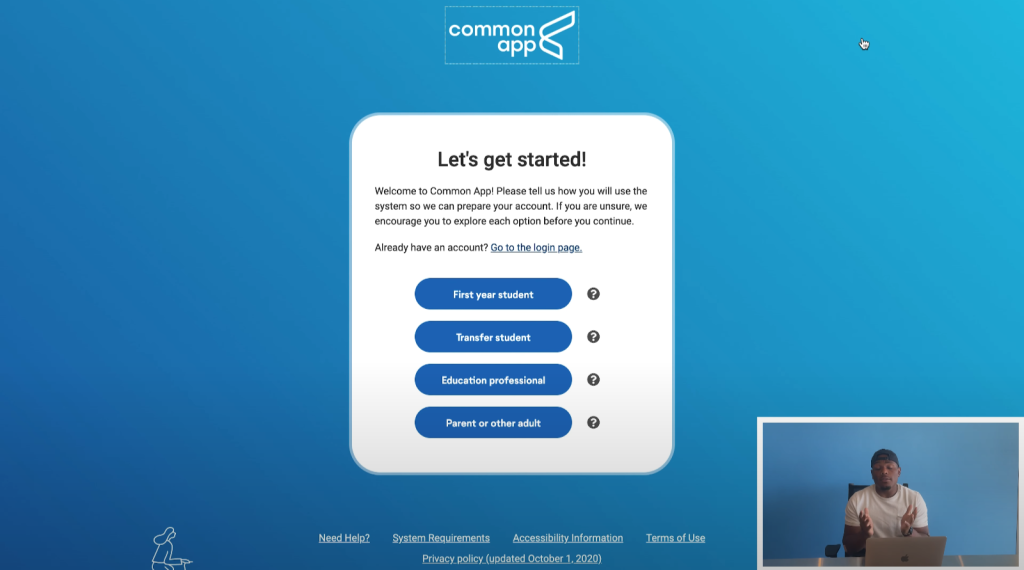
Create a new login
Colleges may need to contact you during the application process, so carefully input an email address for registering a Common App account. Make sure the email you choose:
- Is checked regularly.
- Does not contain inappropriate language.
- Can still be accessed after you graduate from high school (e.g. it is not an email given to you by your high school, since this may be deleted once you graduate).
Complete your registration information
You will need to provide some basic information, such as your full name, home address, phone number, and date of birth.
Be sure to use your legal name exactly as it appears on identification documents like your passport or birth certificate. Make sure it is also the same name you use for standardized tests, so that colleges can accurately match your exam documents with your application.
Finally, you will need to set your communication preferences and agree to the Common App privacy policy. Then click “Create account” to finish creating your account.
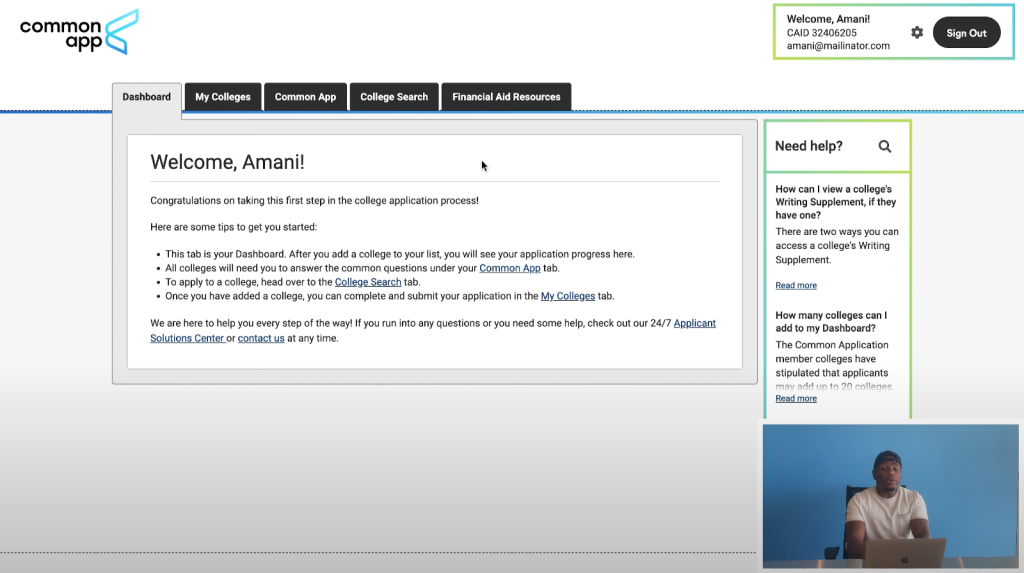
Create a Standout College Essay with Leading Instructors
Step 2: Get to Know the Platform
After you create an account, you will see five main sections on your Common App account: Dashboard, My Colleges, Common App, College Search, and Financial Aid.
- Dashboard will be empty until you add the colleges you plan to apply to. Once you add schools, you’ll be able to see important information for each college you are applying to, including the school’s name, the application deadline you selected, and your application status.
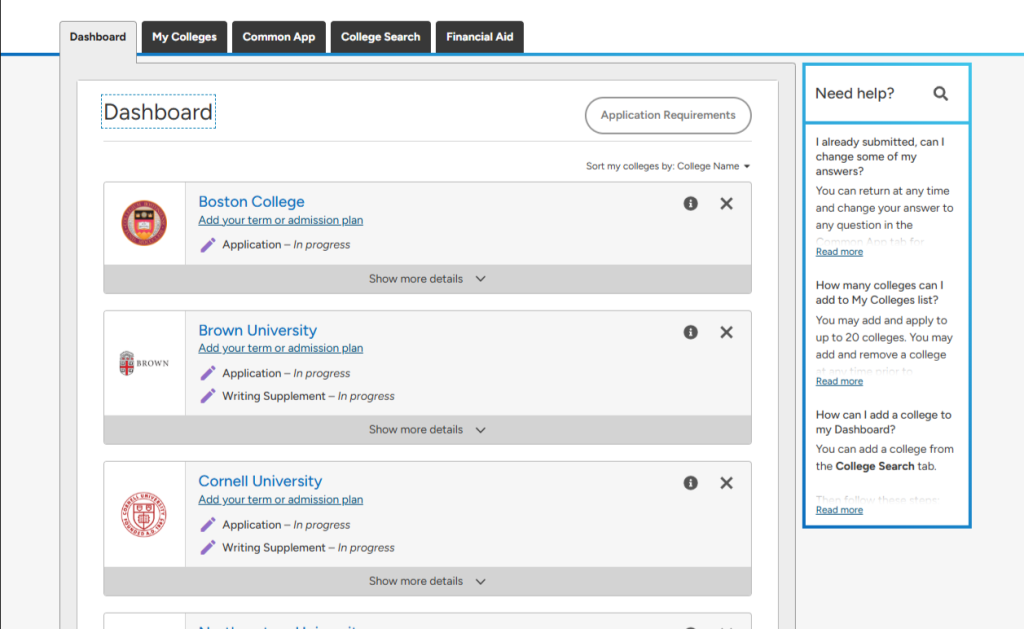
- My Colleges is where you add the schools you want to apply to. This is also where you answer school-specific questions and submit the unique components required by each college.
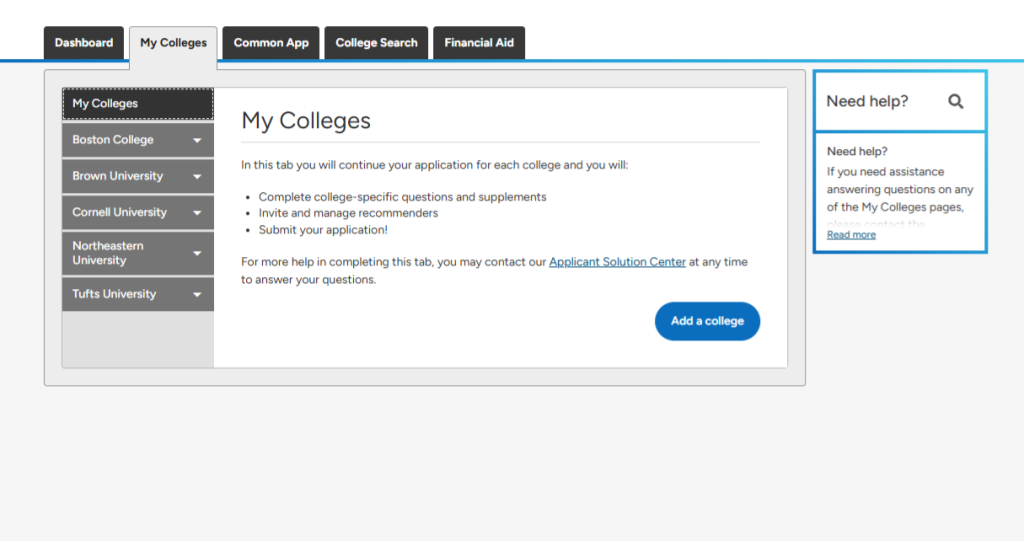
- Common App is where you enter general information that will be sent to all the colleges on your list.
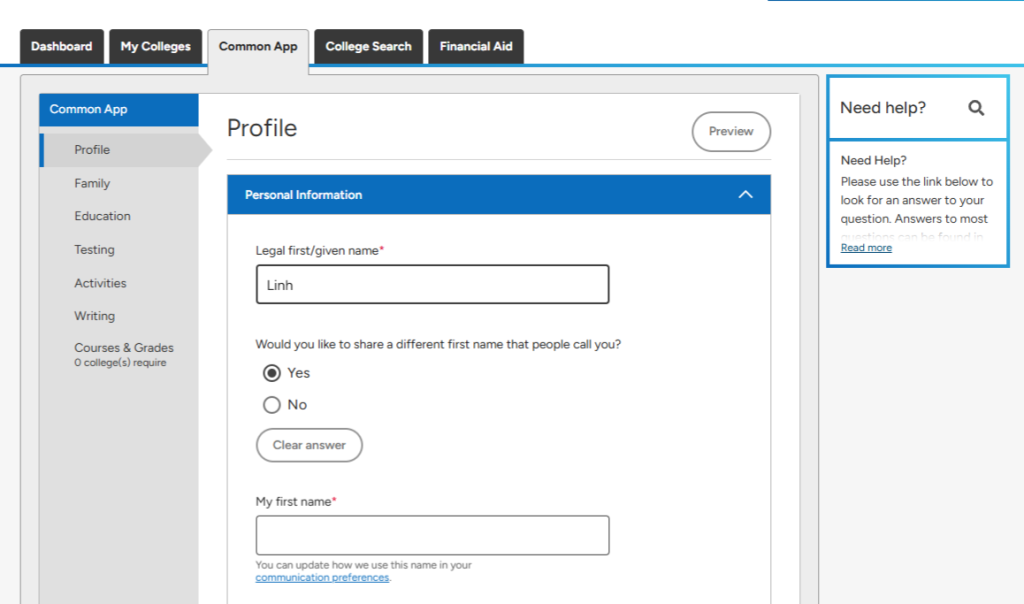
- College Search allows you to look up and add colleges to your application list.
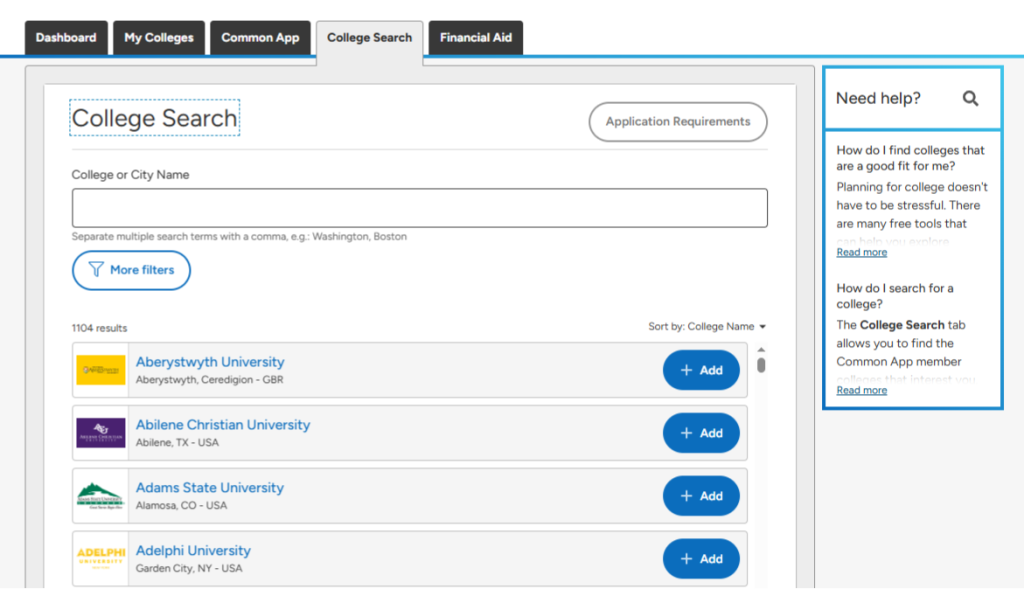
- Financial Aid is where you can learn about and find information on financial assistance.
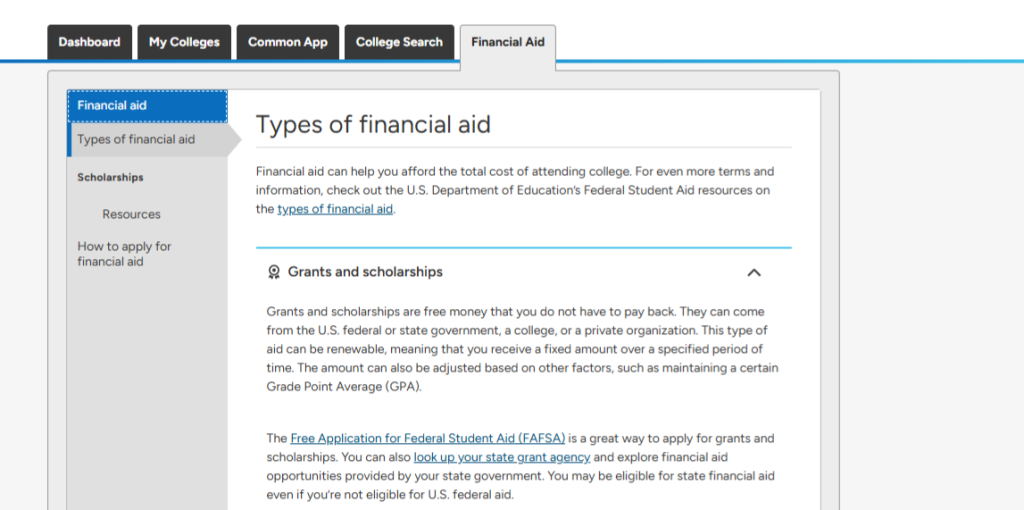
Step 3: Add Schools
After you create an account and explore the features of the Common App, you should begin adding the colleges you plan to apply to. The College Search section is where you can search for and add schools to your account.
If you already have a specific list of schools, you can search by name. If you want to discover more schools to add to your list, you can use the “More Filters” button (advanced filters) to make your search easier. You can select one or multiple filters, such as:
- State or country
- Essay requirement
- Standardized test policy
- Recommendation letter requirement
You can add a school by clicking the “Add” button in the search results list. You can also select a school and choose “Add to My Colleges” on that school’s detail page.
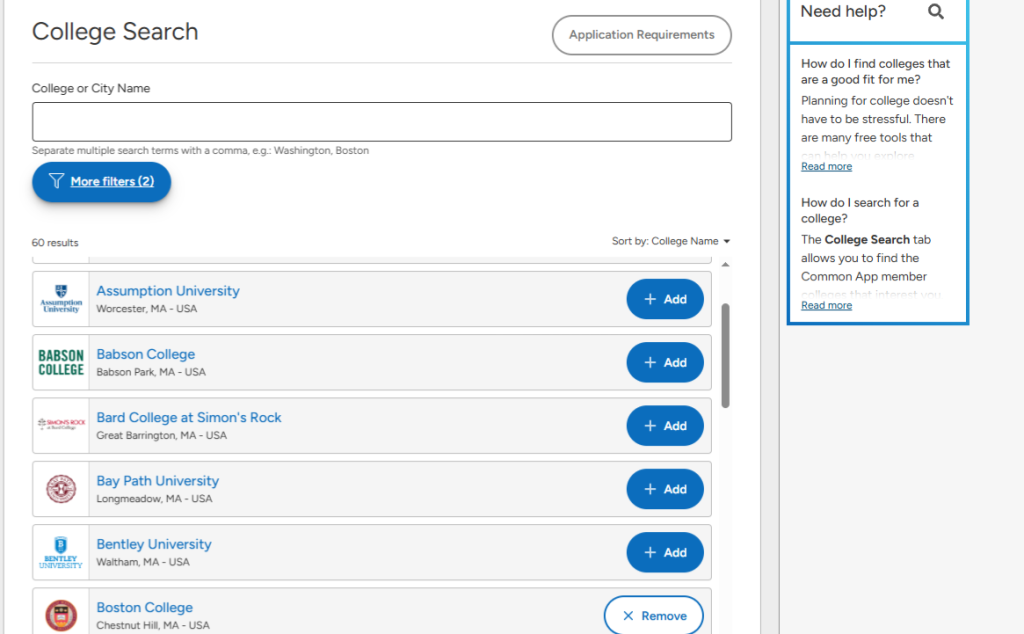
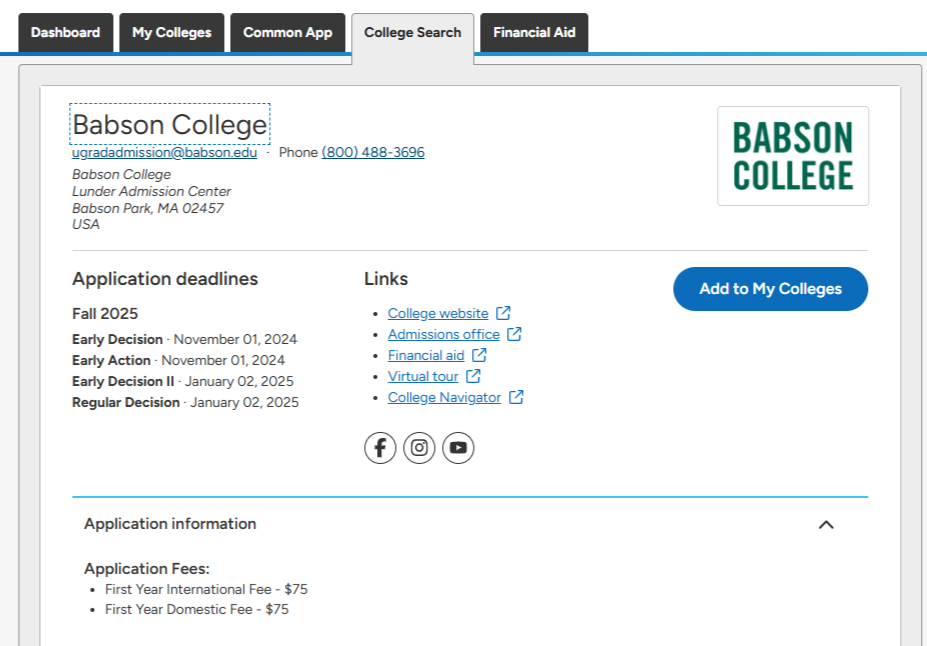
After adding schools, you can view your list in both Dashboard and My Colleges. Note that you can only add a maximum of 20 schools. You may adjust your list at any time, but once you have submitted an application, you will not be able to remove that school from your My Colleges list.
Step 4: Fill Out the Common App Section
The Common App section contains general information that will be sent to all the colleges you plan to apply to, including:
- Profile: Applicant’s personal information
- Family: Family information
- Education: Academic information (high school & middle school, grades, awards, etc.)
- Testing: Standardized test scores
- Activities: Extracurricular activities
- Writing: Personal essay
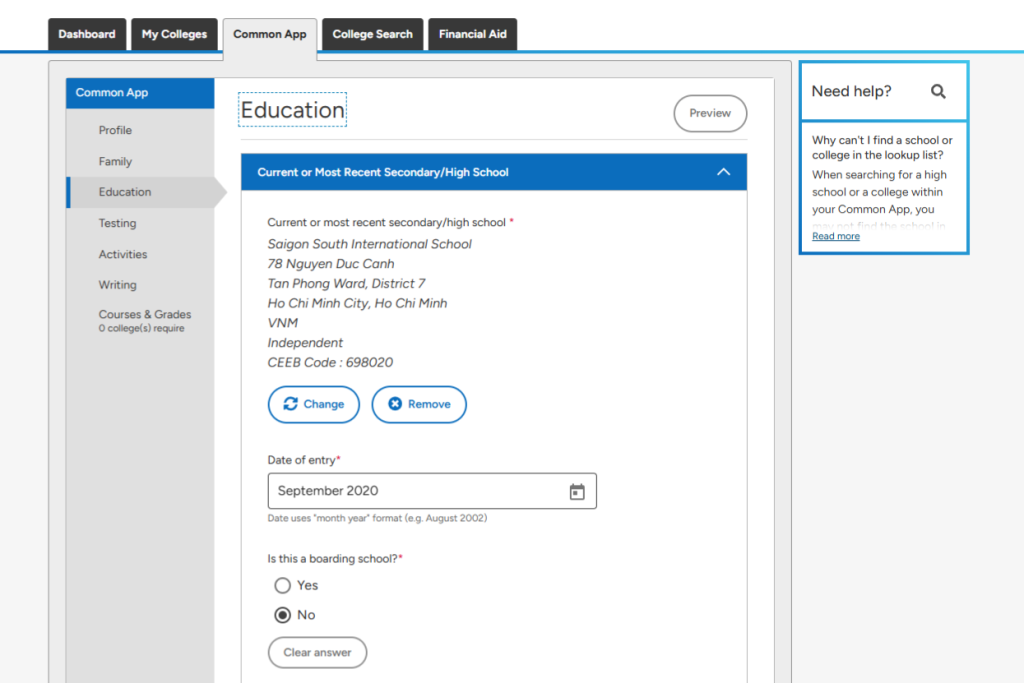
You do not need to fill in all of this information immediately when you start your application. However, basic personal information such as Profile, Family, and Education should be completed early to make submitting other application materials easier. For example, you need to complete the Education section in order to send invitation requests to those writing your recommendation letters.
Step 5: Invite Recommenders
All colleges require official documents from your high school. Many schools also require recommendation letters.
Advisors, teachers, and recommenders will submit these documents on your behalf. Each school has its own requirements for recommendations, which you can check on each school’s information page.
To send an invitation to a recommender, follow these steps:
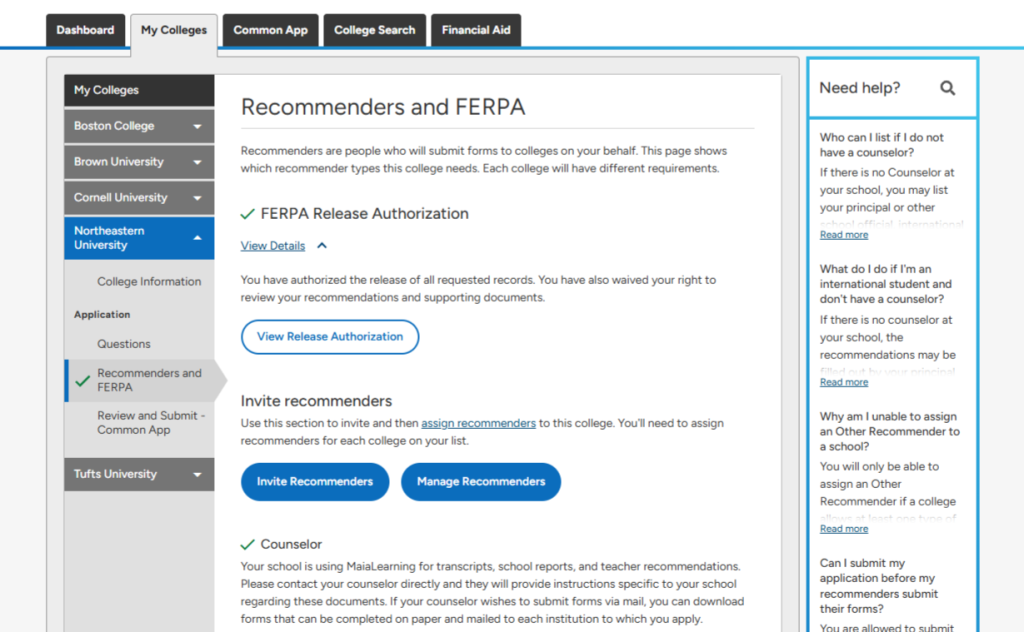
Go to My Colleges, select the college you want to apply to, and open Recommenders and FERPA.
If you haven’t already done so, complete the FERPA Release Authorization.
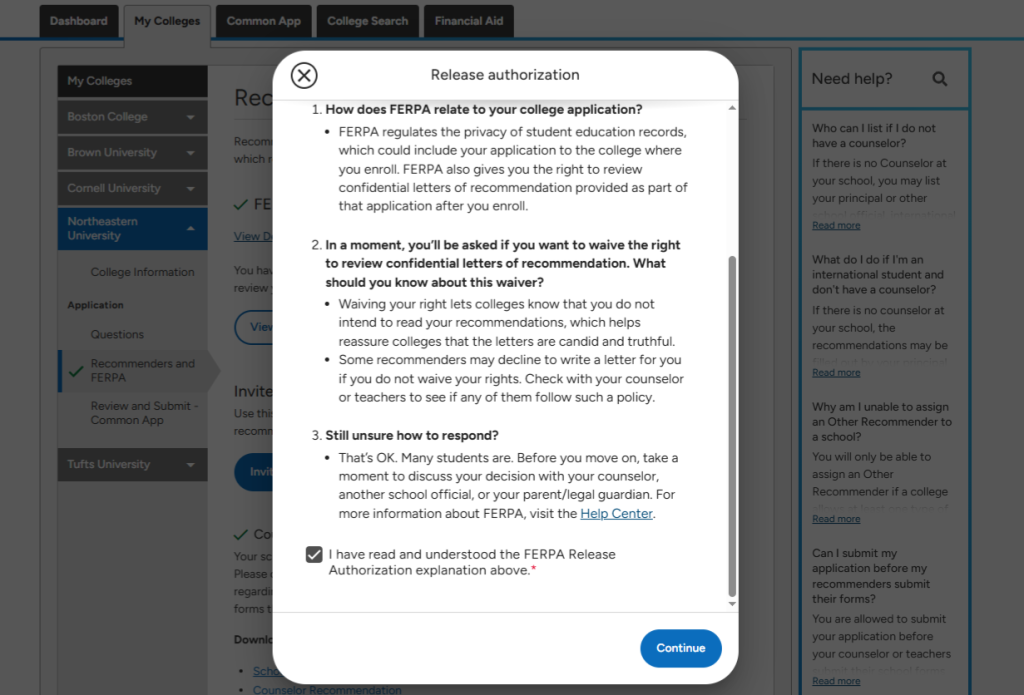
Invite recommenders using the “Invite” button in each section, or use the “Invite Recommenders” button at the top of the page.
Select the appropriate recommender you want to invite. You will need to provide their name and email address.
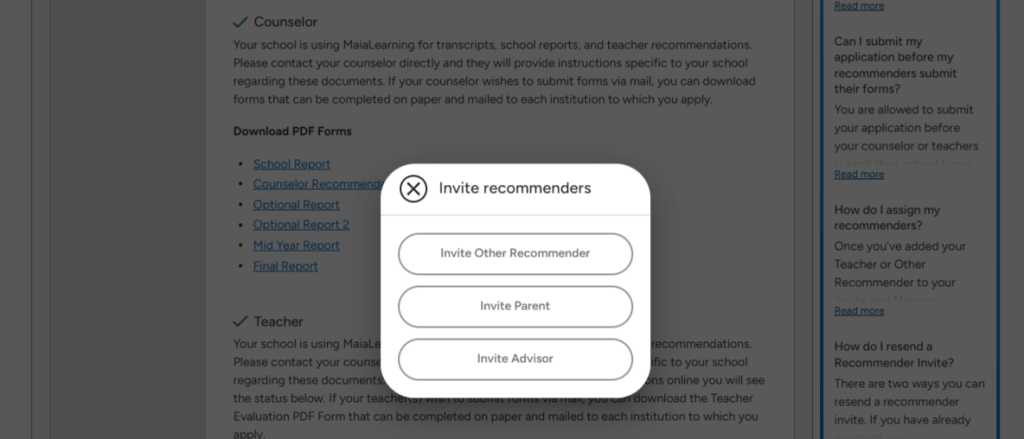
After adding a recommender, you can view their information using the “Manage Recommenders” button.
Note: Teachers, parents, and other recommenders will not receive an invitation email until you assign them to a specific college. To assign, go to the corresponding section on this page, select their name from the dropdown menu, and click the “Assign” button.
Step 6: Prepare and Submit Essays
Essays are usually the part of the application that students spend the most time preparing for when applying to U.S. colleges. The main essay and supplemental essays are submitted in different sections on the Common App: the main essay is part of the general application components, while supplemental essays are unique to each college.
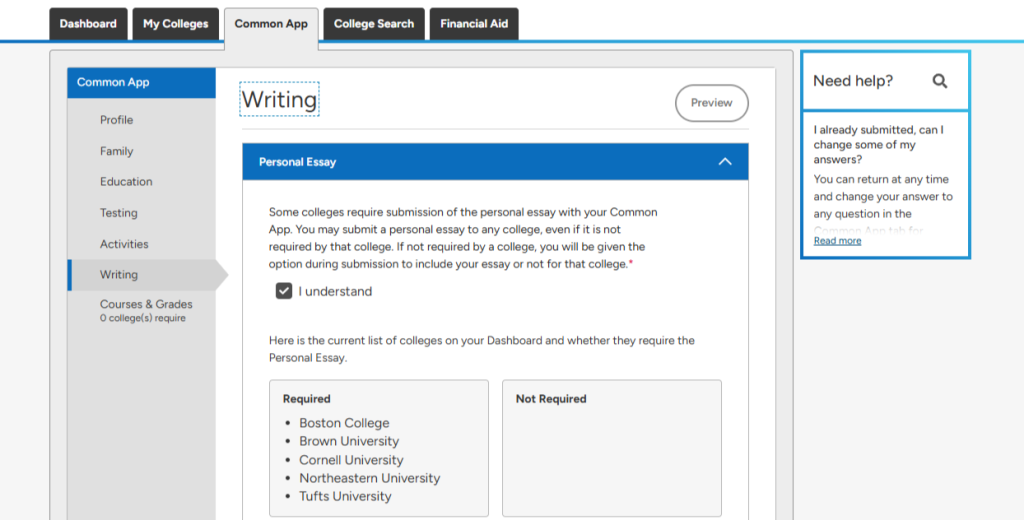
You can find the information to submit your main essay in the Common App section under Writing. Here, you will select the essay prompt you wrote for, then either write your essay directly in the text box or copy and paste the essay you have already prepared into the text box.
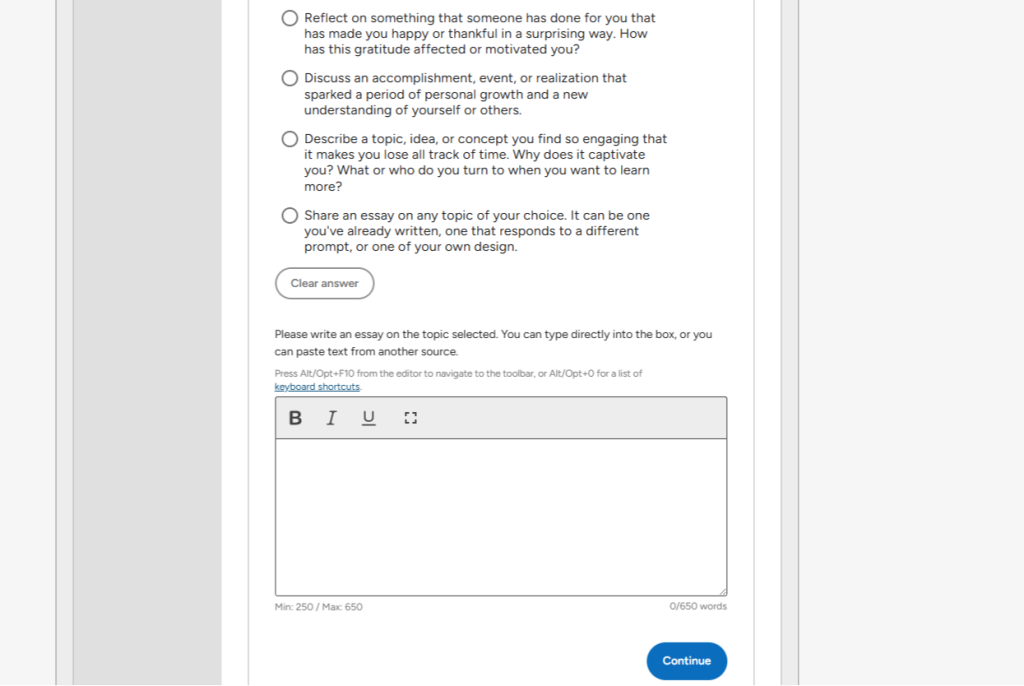
Supplemental essay prompts can be found in My Colleges, under Writing Supplement.
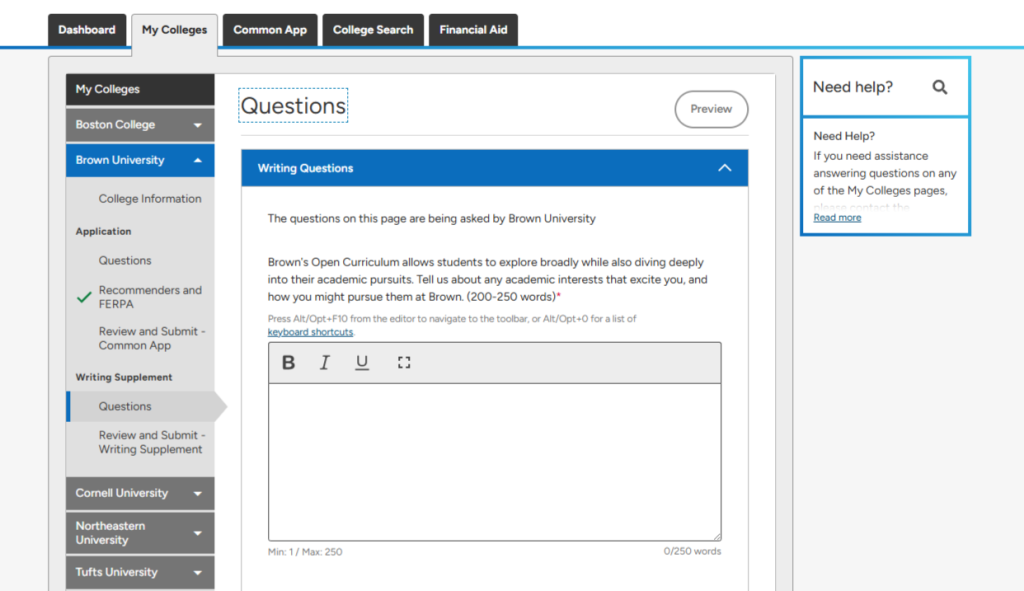
You can view the prompts and enter your responses directly below each question. Not all colleges require supplemental essays, so be sure to carefully check each school’s requirements. If a college does not require a supplemental essay, the Writing Supplement section will typically not appear in that college’s information.
Step 7: Submit School-Specific Requirements
In addition to supplemental essays, each college may have different requirements for personal information and supporting documents. You need to review the application requirements for each school listed under My Colleges and submit the necessary materials accordingly.
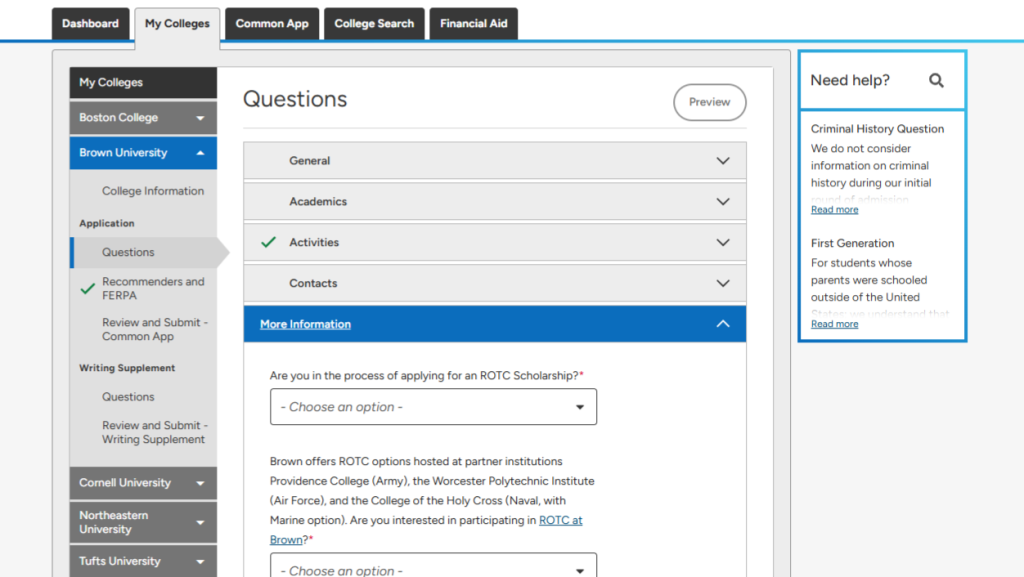
Step 8: Review Your Application
Before submitting your application, carefully review all the information you have entered to ensure it is accurate and matches the information on your identification documents and standardized test score reports for easy verification.
Check the status of your application for each college on the Dashboard. If the status still indicates “In progress,” it means your application is incomplete and some information is missing.

You should also correspond with your teachers or advisors who wrote recommendation letters to confirm whether the letters have been submitted and verified by the Common App system.
Step 9: Submit your application and application fees
Once your application is complete and thoroughly reviewed, you can submit it to each college under My Colleges, in the Review and Submit – Common App section.
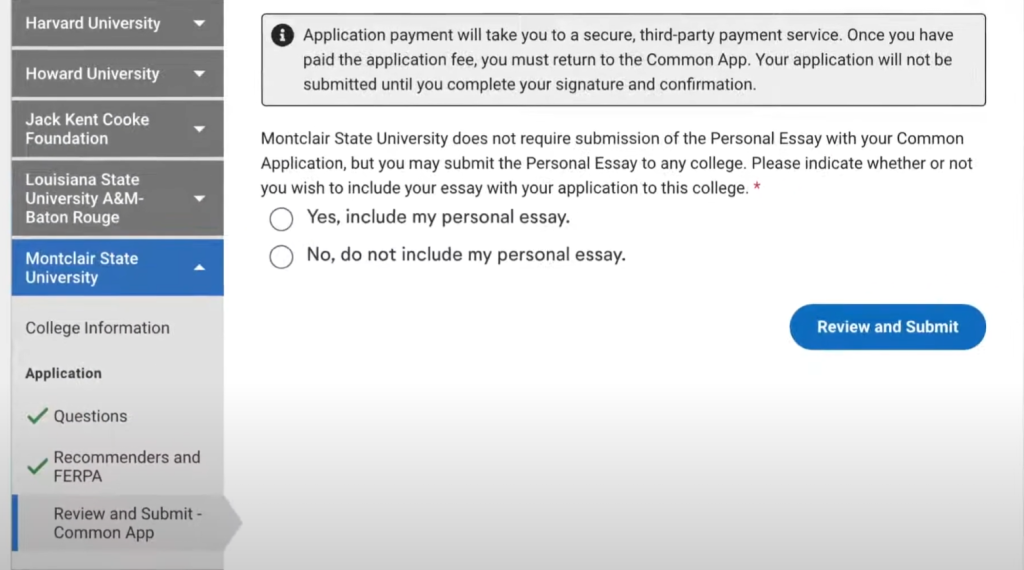
Select “Review and Submit” and check your application information one final time. To submit your application, you must pay the application fee, if required by the college. If you qualify for a fee waiver, you can upload your fee waiver form.
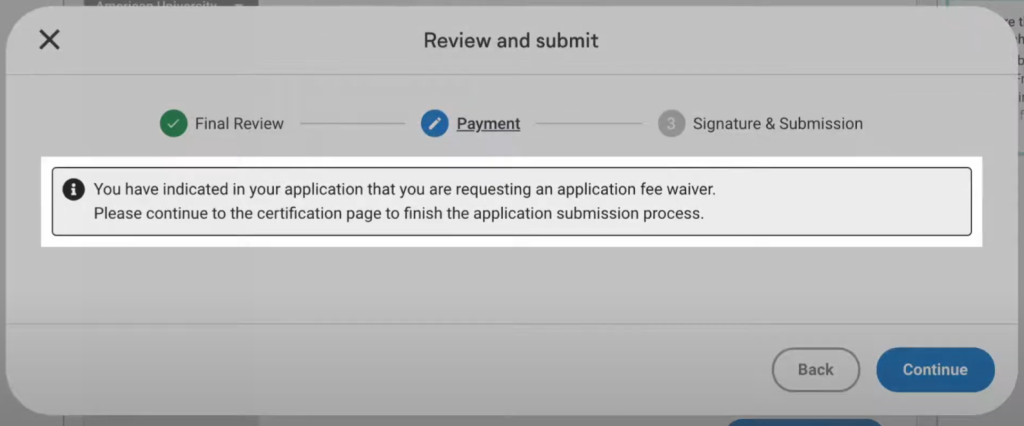
If you do not qualify for a fee waiver, pay the application fee using an international credit card.
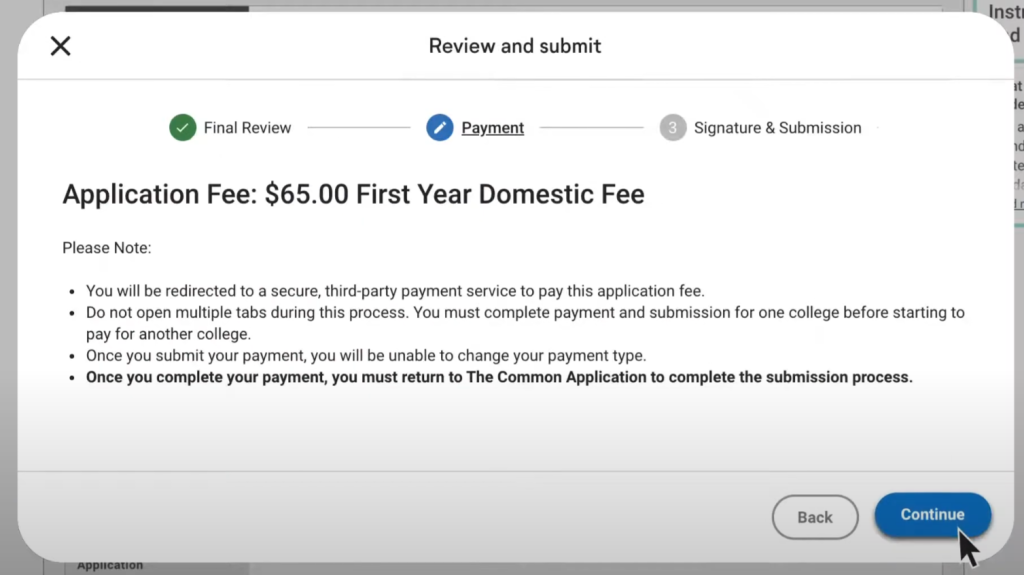
After completing the payment, you can submit your application by accepting the Common App terms, signing, and confirming the submission date.
You can also watch this instructional video from the Common App to better understand the submission process and the tools available in the system.
The Common App system helps students save time and optimize the U.S. college application process. Follow the instructions carefully to submit your applications, and ensure that you meet all school requirements. We wish you a successful U.S. college application process!
Prepare for Your U.S. Study Journey with Aralia
The process of preparing a U.S. college application is no easy task. To build an impressive application that can impress top universities in the U.S., students need more than just high grades. They also need compelling personal essays, outstanding extracurricular activities such as international competition awards, and scientific research conducted during high school.
To help students succeed with U.S. college admissions, Aralia has designed top-tier programs led by professors and instructors from leading U.S. universities and high schools. These mentors have guided Aralia students to achieve numerous prestigious international awards, craft compelling personal essays, and complete scientific research published in leading international journals.

College Application Essay Writing Program
COLLEGE APPLICATION ESSAY WRITING PROGRAM Craft college admission essays that get you noticed Our expert-guided programs help students write application essays that will stand out

Competition Preparation
Competition preparation Preparation that wins awards Aralia helps students prepare for top academic competitions. Our students have earned national and international awards in writing, research,

AP Exam Preparation
AP® Exam Preparation Achieve your dream AP® scores Maximize study efficiency and accelerate score improvement with practice examinations, expert strategies and personalized guidance Free Consultation





